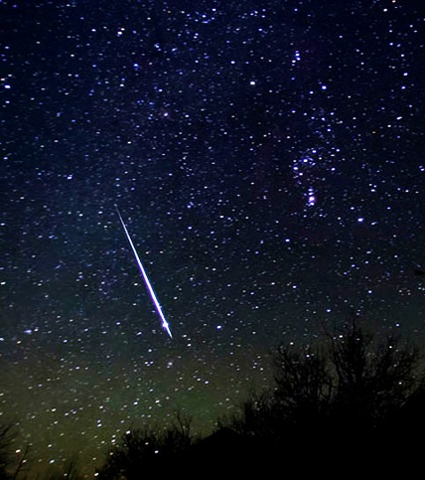 new creation
new creation Entries in new creation (3)
Harbingers of the Age to Come
 Thursday, August 20, 2015 at 12:02AM
Thursday, August 20, 2015 at 12:02AM  Last week my wife, daughter and I watched the Perseid meteor shower, and as an added bonus we gawked at the Milky Way glowing in the Southern night sky. Together, we stood awed by creation. Before the night ended we revisited the Psalm, The heavens declare the glory of God;
the skies proclaim the work of his hands.
Last week my wife, daughter and I watched the Perseid meteor shower, and as an added bonus we gawked at the Milky Way glowing in the Southern night sky. Together, we stood awed by creation. Before the night ended we revisited the Psalm, The heavens declare the glory of God;
the skies proclaim the work of his hands.
Stars, mountains, plains, wind, sea and sky: each of them has the power to ravish our hearts and mess with our minds. It’s no less true simply because everyone knows it: all creation sings the greatness and God’s glory. Even our fallen creation—a world beset by storm or drought—reflects the mind-numbing image of the infinite Creator-God. It doesn’t matter if nature is ‘red in tooth and claw’ because through this veil of sin-afflicted creation we catch glimpses of eternity. What we see staggers our footing.
Yet today I’m wondering about something beyond creation. If nature reflects the glory of God, how much more should the new creation?
The day will come when all creation is restored to magnificence. Revelation describes a paradise-city, given directly from God, occupying the space we call “Earth.” Lions lie down with lambs. The tree of life bears fruit in every season, with leaves that heal the nations. The river of God flows to the ends of the earth. It sounds amazing, doesn’t it? Creation will be so glorious every atom and molecule will itself sing the praises of God.
If only there were some way the glory of that future world, restored and redeemed, empowered with resurrection life, could declare the glory of God in this present age. If only. But wait: I seem to recall something about a new creation among us, in the here and now. Let’s see . . . it’s here somewhere (just a moment) ah! Here it is:
Therefore, if anyone is in Christ, the new creation has come: The old has gone, the new is here! (2 Corinthian 5:17)
Here is an amazing fact: the citizens of the restored earth (which is not yet revealed) are being born now. Born from above. And even more staggering: we are the glory of the future age made manifest now. Is it possible that the majesty of the age to come could be exhibited in us, now? Paul wrote these words to a rag-tag group of believers in the City of Corinth. He was not being poetic. He was no inspirational speaker. He worked his way up to the statement above in the four chapters before:
In chapter one he reveals that whatever comfort he has received is his to give to others (vs. 3-7). In the age to come God himself comforts his people; in this present age his new-creation people are here now to comfort others.
In chapter two Paul describes an aroma of the age to come (vs. 14-16) To some it smells lovely, to others it is the stench of death—but its source is not of this age.
In chapter three he reminds us that the Old Covenant was capable of generating a visible glow on Moses' face. The New Covenant is capable of an even greater impact on our physical bodies (vs. 12-18).
In chapter four we discover that we are vessels of an “all-surpassing power” (vs. 7-12). These are the powers of the age to come, which we steward in jars of clay, leaking bits of eternity into this present age.
Paul is trying to say that we are the harbingers of the age to come. The cracked and flawed containers so characteristic of the fading glory of fallen creation are revealing the glory of a new creation. It’s not simply a theological position: Paul is describing a reality. Followers of Jesus carry resurrection-life within them. That resurrection-life is given by God at the new birth to glow through us, radiate from us, even fill the room with a fragrance of flowers from paradise. We must choose whether these are mere metaphors or if Paul is describing the reality of new creation, a new creation implanted within us when we are born from above. (Would it be too mystical for me to tell you I’ve met followers of Jesus who quite literally glow with his glory and smell of eternity? I have.) My contact with such believers stirs in me the desire to live as if the age to come could be manifested in my body as well. They radiate the age to come; I am filled with yearning for a homeland I've yet to see.
Poet John Mark McMillan expresses the same desire:
I will be Your lamp if You will pour the oil
If You light the incense, I will be Your censer
I will be Your tabernacle if You will be my ark
I will be Your body if You will be my heart
Perhaps we could pray together: “Let it come through me, because I am a part of the new creation.”
Why not receive Students of Jesus in your inbox? Subscribe to our email newsletter and never miss a post.
Meditation: Invasion of the Body Snatchers
 Monday, November 19, 2012 at 01:32PM
Monday, November 19, 2012 at 01:32PM  I did not grow up a church-boy. After becoming a Christian I wandered through backyard Bible studies, late night prayer meetings in odd places, and lived my Christian life among strange, semi-cultic fellowships of networked home churches. I was baptized by a college kid, who dunked me into a suburban swimming pool just after midnight. One of the people who got baptized that night shouted, “Hold me under a long time--I’ve got a lot to die for!”
I did not grow up a church-boy. After becoming a Christian I wandered through backyard Bible studies, late night prayer meetings in odd places, and lived my Christian life among strange, semi-cultic fellowships of networked home churches. I was baptized by a college kid, who dunked me into a suburban swimming pool just after midnight. One of the people who got baptized that night shouted, “Hold me under a long time--I’ve got a lot to die for!”
I must have been 25 years old before I ever saw a proper church baptism. When I did, I was fascinated with the phrase repeated over and over again, “Arise to walk in newness of life.” The words rang with freshness and truth. They also sounded vaguely familiar, so I used my New American Standard Bible and tracked down the words to Romans, chapter 6: “Therefore we have been buried with Him through baptism into death, so that as Christ was raised from the dead through the glory of the Father, so we too might walk in newness of life.”
It’s an amazing assertion: that the born-again experience produced an entirely new creation, a new order of being. My amazement, though, gave way to an observation: these words were too good to be true. Most of us gently changed the meaning to something easier to grasp. “I’ve been clean-up by God,” or, “My sins have been washed away,” or, ”My past has been forgiven.” All these things are true, but they are something very different from a new creation. Eventually I began to wonder, what good is it to have your past forgiven, if you are essentially the same person? When someone is only forgiven--merely forgiven--the recidivism rate for sin is sure to be 100%. We will do it again.
But imagine a new creature, something--someone--born from another realm, with different desires, different needs. Someone who feeds on different food, breathes different air, and drinks from an entirely different fountain. Imagine that the change is wrought inside-out, so that the outer appearance is unchanged, but the spiritual body chemistry is other-worldly. What if we could be redeemed versions of the pod people from Invasion of the Body Snatchers?
It’s worth meditation: what if newness of life actually meant a life of another kind? But that would be too weird, right?
If Only The Future Were Now
 Thursday, August 4, 2011 at 01:06PM
Thursday, August 4, 2011 at 01:06PM - In chapter one he reveals that whatever comfort he has received is his to give to others (vs 3-7). In the age to come God himself comforts his people; in this present age his new creation people are here now to comfort others,
- In chapter two Paul describes an aroma of the age to come (vs 14-16) To some it smells lovely, to others it is the stench of death--but its source is not of this age.
- In chapter three he reminds us that the Old Covenant was capable of generating a visible glow on Moses' face. The New Covenant is capable of an even greater impact on our physical bodies (vs 12-18)
- In chapter four we discover that we are vessels of an “all-surpassing power” (vs 7-12). These are the powers of the age to come, which we steward in jars of clay, leaking bits of eternity into this present age.



